BetterRide Skills Clinic: Baltimore June 2-4, 2007
In November 2005 I took a private lesson from mountain bike skills coach Gene Hamilton of BetterRide.net
The original intent was to attend a 3 day camp in Richmond but unfortunately, that camp had sold out before I committed. Since I was an experienced rider (17 years+) with some decent skills the private lesson seemed like a good idea. It was an incredible experience and completely changed how I looked at mountain biking skills. And I also made a huge leap in my skills within a few months afterwards.
After the lesson I was in total information overload. But it was a turning point in my mountain biking journey. The only regret is that I wished that I'd taken the 3 day camp. This past weekend this wish was realized when I attended a 3 day camp up in Baltimore. Special bonus, it included guest coach Marla Streb.
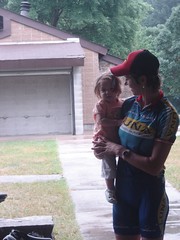
This camp was just awesome. Even with almost 19 years experience on a mountain bike and a BetterRide private lesson under my belt it was just phenomenal. I'm pretty decent but there is a lifetime of room to grow. Even the true superstars in sports (Tiger, etc) are always growing and always striving to be better so why not an amateur mountiain biker. Gene's teachings have shown me that there is no limit.
Why go to a camp anyway?
Mountain Biking is a relatively new sport. There just isn't a lot of well defined instruction out there such as with snowboarding,golf, tennis, martial arts, ..... In addition, mountain biking was founded on an outlaw spirit and the culture of self sufficiency. The notion of mountain bike instruction is often met with skepticism especially from experienced riders. The most often mentioned advice is, "Just Ride. Just spend time on the trail."
The problem is that similar to movement sports like golf and snowboarding, mountain bike skills are often very counter intuitive. Learning becomes much more trial/error where the error=scars w/o a lot of knowledge gained as to why things happen. Trail time and just plain experience, of course, can develop a certain proficiency at mountain biking. However it's very difficult to really understand why you were able or not able to do something. I also found that after a certain amount of time skills plateaued and there was very little improvement after that. Crashing is a part of mountain biking. However, not understanding why you crashed in the first place dooms you to repeat the mistake over and over.
Yet no one would think twice if you were to say, I'm going to snowboard camp or I signed up for a round of golf lessons.
The 3 day camp is definitely the way to go if you can do it for two main reasons. One, there is just so much information that spreading it out over 3 days lets you assimilate it a little easier. And secondly, you can learn a hell of a lot by watching the other students in the class.
In fact, I found the ability to watch and learn from the other students to be one of the most beneficial things from the camp. Very experienced riders might feel that taking a camp with beginners might not do them as much good. However, the ability to watch someone else and see the affect of applying the skills that Gene teaches is an excellent way to learn. This affect of the core skills is even more amplified in beginners so it is much more apparent.
Without video footage of yourself it is impossible to have sound objectivity of how you are riding or body position. It's extremely difficult to know how far leaned over or how bent your elbows are as the mind's perception is usually full of crap. This is one reason why a coach can be so beneficial, they can be objective eyes upon you. And you can be an objective observer of the other students in class.
In addition, improvement usually takes place in baby steps over a period of time. As such, getting better is often transparent to the rider sort of like watching your kids grow. Day to day they don't change but all of a sudden they are growing up. By watching other people it's readily apparent that this sh*t works.
For example, we were sessioning on a pretty steep uphill pitch with a sharp right hand turn at the top. The track had a bunch of half buried chattery rocks and was not an easy pitch. One of the riders was climbing it and was struggling on the verge of stalling out. Gene was at the top past the corner and was coaxing vehemently (ok, he was yelling) to "LOOK UP, LOOK AT ME". When the rider applied the vision techniques we learned the affect was dramatic. His pedal stroke evened out, his upper body relaxed and the bike tracked effortlessly through the turn and towards Gene. He looked amazing, and the change from being on the edge to being in total control happened in an instant.
Seeing the core skills in action on someone else had as much if not more benefit than practicing it myself.
Another side benefit of the camp was seeing the empowering capability of mountain biking experienced by the other riders. People were doing things they never thought possible at the end of 3 days. One woman's smile just got bigger and bigger as the camp continued as she transformed through the class. A few weeks after the camp I got to experience a similar feeling as I applied some of the core skills in a rock garden.
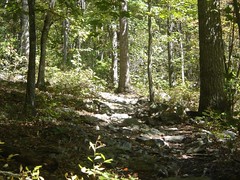
It scared the heck out of me. And it was something I never thought I'd ever do. That is empowerment. Bottle that stuff up and make a million.
The Coaches
This camp included a special guest coach, Marla Streb. Marla is probably one of the most recognizable faces in the tiny niche of mountain biking. With a wild woman reputation and single speed world championship tattoos it's hard not to have a mystique like Marla. However she's very down to earth and approachable.
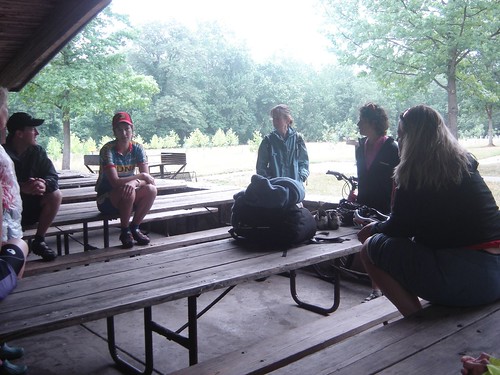
Marla is extremely intelligent and very articulate. She has a knack for explaining things with a foundation in science yet easy to understand which isn't surprising given her research background. She represents her sponsors very well.
Her kung-fu is quite good too.
Graceful doesn't even begin to describe her riding style. Marla is the epitome of power and fluidity gliding through the trail. No momentum lost, never letting the front wheel hit anything.
Gene has good kung-fu too. You can't stand on the podium of a world Master's downhilling championship w/o being fast. But, from our perspective as students, how fast you are isn't the most important thing. How fast can you make me is more important. Gene's made the effort to understand why things happen and to break down mountain biking into core fundamental skills. More importantly, he's got a knack for analyzing rider's individual weaknesses.
I'm really impressed with his coaching ability. Each rider had individual issues and each rider has their own learning style. Some are tactile, others are visual. He's pretty good as saying the right thing to help someone make a concept click.
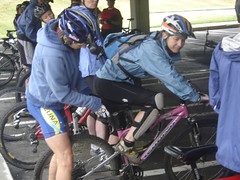
While both are very analytical in their approach to mountain biking they also work hard at developing the ability to turn off the brain when they neeed to.
They are true professionals in their sport but it was interesting to see their 'mortality' with respect to mountain biking as well. Just like all of us at the camp, they made mistakes, tried too hard, and sang funny songs in order to disconnect their brain. At one point I was discussing how truly difficult it was to keep my vision looking up. They both agreed that there are probably only 2 or 3 riders in the world that do it perfectly all the time and that they struggle consistently to work on their own fundamentals.
Gene's philosophies
I'm a big fan of Gene's teaching philosophies. None of what he's coaching is brand new or novel. What's significant is that he's taken the extremely complex aspects of mountain biking and broken them down to fundamental core skills. The value of this simple act cannot be taken lightly.
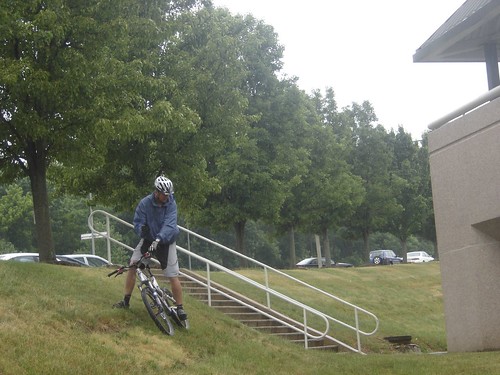
Breaking complex movements down into focused component skills enables the teaching of these complicated motions. It is just too difficult to teach someone a multi-level skill such as cornering without breaking it down into individual components. Each core skill has dedicated drills associated with them. The drills are first introduced in parking lots or grass which are non-threatening environments. By performing the drills in parking lots we can focus all our attention on them and not be worried about the trail, rocks, roots, trees, etc.
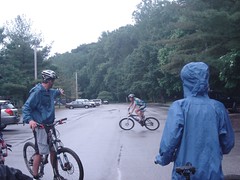
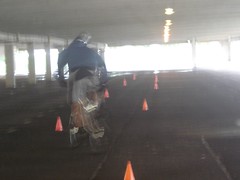
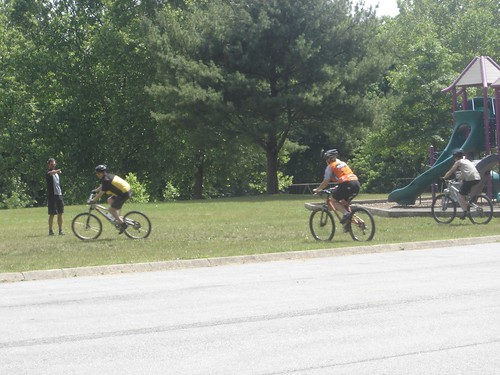
These drills are not easy either. Parking lot or no parking lot, it takes every ounce of concentration to perform them. The ironic part is that the less you think about it the better you do. But the first times you do them it requires lots of focus. I had the benefit of learning the drills over a year ago and have been practicing them since. To the other campers my performance may have looked easy. But Gene will attest to how stiff and awkward I was the first time I did the endless drill. On some days we probably only rode 1 mile or two total. But I was utterly exhausted at the end of the day from mental fatigue. Which closely drives physical fatigue.
The order in which he teaches the skills is also no accident. Similar to a periodized training plan where each period builds upon the last and leads into the next, the core skills he teaches build into more complex skills.
Included in the core skills are things you've heard of in every book you've read on mountain biking yet I'm telling you that there is no substitute for having someone like Gene get you to really feel what it means to do them right. In addition, Gene stresses the importance of also doing the skills wrong.
For exmaple, one camper was cornering with the inside leg down sometimes even on a switchback. She knew that something wasn't right and was able to contrast this feeling to cornering correctly with the inside leg up. I'm a firm believer in the principle that you don't know if something is working right until you break it and then fix it.
This type of general architecture is seen across many sports. Tennis, snowboarding, martial arts. The pattern is common. Complex movements are broken down to core fundamentals. The fundamentals are drilled in repetitive movements. Over time the movements are developed in muscle memory and become more second nature and don't have to be focused on 100%.
Think how many practice balls are hit in tennis? Or how many balls are hit at the driving range or shag field.
The key though isn't how much you practice but rather HOW you practice.
The cool thing about mountain biking is that it is just an inherently fun activity that even practicing can be fun. The drills are actually very enjoyable, and on trail practice where you focus on one component is also fun. At some point, though you just gotta ride w/o concentrating so much. Over time the quality practice leads to the breakthroughs on the trail that provide the perma-grin associated with railing it on the trail.
In fact the real goal of this camp is to not come out mastering any of the core skills. But rather, the goal is to just get an inkling of what it feels like to do them right even if just for an instant. Learning takes a while. The body/mind needs plenty of time to take new skills and make them second nature. But the truly important aspect is that you know how to do it right. So that you have a goal to strive for in practice. Practice does not make perfect. Perfect practice makes perfect.
Application of the core skills
Of course, it wouldn't really be a mountain bike camp w/o riding on the trails. The core skills developing in the parking lot drills are then applied on real trails. We rode the very fun trails at Patapsco and would stop at different sections. Gene and Marla would point out how to analyze sections and then we would each run through the trail under their watchful eye.
Without fail, each of us totally forgot everything we had just worked on in the parking lot drills. There was just too much going through our heads once you add the trail into it. Again, Gene's coaching helped refocus us. He'd get us to just focus on one thing. Then we'd move on to focus on another thing. In this manner we were able to once again hone in on each of the core skills.
I'm bummed I didn't bring my camera on the trail excursions because it was amazing to watch Gene, Marla and the other students rail some of these turns.
Just the beginning
A camp like this is really just the beginning. If anyone is thinking that you can attend one and come out the next day ready to blow away your friends or move up 10 spots on the podium you better think again.
The irony of doing something like that rock garden I mentioned earlier is that even though I proved to myself that riding with my head level and looking in the distance actually works. I am going to have to re-prove it every time I go riding. The concept is just so counter to every sensibility in my head that it's going to take constant reinforcement.
But without instruction like Gene provides, I'd never have known a 'right' way of doing things. Not that his methods are the only way, but they are one method that is going to work in almost all situations.
Regrets shouldn't be part of life. But my god, I can't imagine where I'd be in mountain biking if I'd had instruction like this 20 years ago.
In his book Mastery:The Keys to Success and Long-Term Fulfillment George Leonard highlights the 5 keys to mastery.
#1: Find a good teacher
#2: Practice
Gene's a great teacher and just as important, he provides fundamental practice drills and practice methodology. I'm totally convinced performing these drills consistently especially when on the plateau is the key to improvement.

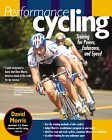
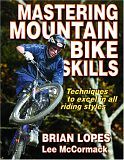
1 Comments:
Great write up Ashwin! It was great meeting you and participating in the camp together. Watching you allowed me to see what a great rider I can be with practice. Thanks for the pics too!
Post a Comment
<< Home